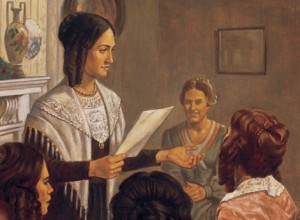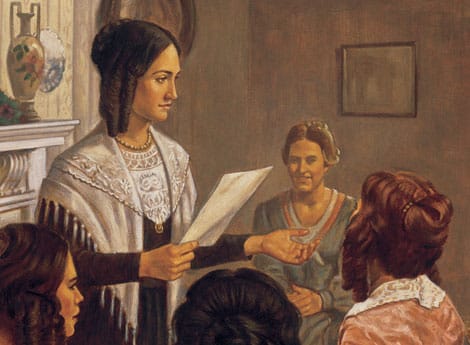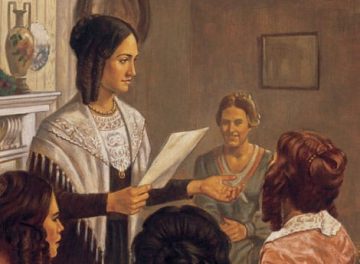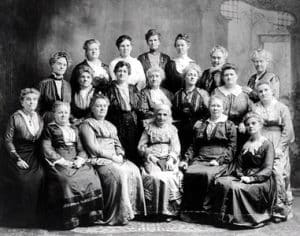 There are some beautiful gems within this chapter, but as our history is rich, I would teach this particular lesson with Daughters in My Kingdom in my left hand, and the Nauvoo Relief Society Minute Book in my right. (Metaphorically, of course.) I would also draw upon Mormon Enigma and “A Gift Given, A Gift Taken,“ if I had time.
There are some beautiful gems within this chapter, but as our history is rich, I would teach this particular lesson with Daughters in My Kingdom in my left hand, and the Nauvoo Relief Society Minute Book in my right. (Metaphorically, of course.) I would also draw upon Mormon Enigma and “A Gift Given, A Gift Taken,“ if I had time.
One of the very best things about this lesson is also one of the earliest. It is simply the inclusion (and highlighting!) of the full, unadulterated quote by Joseph Smith, affirming that he did indeed turn the key to the Nauvoo Relief Society, rather than in their behalf (as some church publications previously alluded):
I now turn the key to you in the name of God, and this society shall rejoice and knowledge and intelligence shall flow down from this time — this is the beginning of better days to this society.
This quotation will also show up in the lesson again, in greater context.
The building of the Nauvoo Temple is an important narrative threading throughout the chapter. This makes sense, as Joseph Smith and other early Latter-day Saints were profoundly interested in building Zion, and temples were seen to be a big part of that.
Both men and women desired to contribute to this great cause. One sister, Margaret Cook, suggested that she could provide needlework to help support those physically building the temple. Another sister, Sarah Kimball, offered material to help her, and they discussed inviting others to start a sewing society, to benefit the temple. The following Thursday “about a dozen of the neighboring sisters” met together in Sarah’s home.
The chapter then points out that it it was common in that time for women to start such “benevolent” societies, as well as to write their own constitution and bylaws. As such, the women did so, and then took them to their prophet for approval. Joseph told them that they were “the best he had ever seen” but that the Lord had “something better for them than a written constitution.” He invited them to meet together with him and a few of the brethren the following Thursday, and he would “organize” them “under the priesthood after the pattern of the priesthood.”
The following Thursday was a date that many of us might know, as it is a day we often gather together with our own Relief Society sisters to eat cake: March 17. The founding year was 1842. Twenty women gathered together on one of the floors of the “red brick store” with Joseph Smith and two early apostles to learn the higher pattern for their organization.
The lesson tells us that “Joseph Smith’s wife Emma was chosen to serve as the president of this new society,” which is exactly when I would bring in the minutes from the Nauvoo Relief Society. While it is important to know that she was chosen, it is equally important to know who she was chosen by (as well as some of the accompanying remarks). Joseph Smith
propos’d that the Sisters elect a presiding officer to preside over them, and let that presiding officer choose two Counsellors to assist in the duties of her Office — that he would ordain them to preside over the Society — and let them preside just as the Presidency, preside over the church; and if they need his instruction — ask him, he will give it from time to time. (p 4, Minute Book)
Directly following, Brother Joseph added, “Let this Presidency serve as a constitution — all their decisions be considered law; and acted upon as such,” as well as, “If any officers are wanted to carry out the designs of the Institution, let them be appointed and set apart, as Deacons, Teachers &c. are among us” (p 5, Minute Book). (Clearly he was serious when he said he would organize the women “after the pattern of the priesthood.”)
It was “motioned by Sister Whitney and seconded by Sister Packard that Mrs. Emma Smith be chosen President.” The motion “passed unanimously” (p 5, Minute Book).
Mov’d by Pres Smith, that Mrs. Smith proceed to choose her Counsellors, that they may be ordain’d to preside over this Society, in taking care of the poor — administering to their wants, and attending to the various affairs of this Institution. The Presidentress Elect, then made choice of Sarah M. Cleveland and Mrs. Elizabeth Ann Whitney for Counsellors — (p 5, Minute Book)
Joseph Smith then “read the Revelation to Emma,” from the 25th section of the Doctrine and Covenants, “and stated that she was ordain’d at the time…to expound the scriptures to all, and to teach.” But, “not she alone… other [women] may attain to the same blessings” (p 5, Minute Book). That the first prophet believed women may be ordained to expound scripture and teach is powerful to me. This is one of the errands and gifts “that as sisters we claim.”
After sharing a portion of this information, the manual states, “After some discussion, the sisters decided to call themselves the Female Relief Society of Nauvoo,” and then it includes an already great line from Emma that becomes even greater when understood in context.
The name, “The Nauvoo Female Relief Society” was first suggested by Counsellor Cleveland, and “secon’d by Counsellor Whitney. Elder Taylor offered an amendment that it be called The Nauvoo Female Benevolent Society” which he believed “would give it a more definite and extended idea of the Institution” (p 7, Minute Book). Counsellor Cleveland seconded.
But it didn’t end there. No, no, no. “The Pres [Emma] then suggested that she would like an argument with Elder Taylor on the words Relief and Benevolence” (p 8, Minute Book). The “popularity of the word benevolent” was “one great objection,” because “no person can think of the word” without thinking of “corrupt Institutions of the day”: she did “not wish to have it call’d after other Societies in the world” (p 8, Minute Book).
“One objection to the word ‘Relief’ was that the idea associated with it is that of some great calamity — that we intend appropriating on some extraordinary occasions instead of meeting the common occurrences ” to which “Pres Emma Smith remark’d — we are going to do something extraordinary —when a boat is stuck on the rapids with a multitude of Mormons on board we shall consider that a loud call for relief — we expect extraordinary occasions and pressing calls” (p 8, Minute Book). (Ladies and gentleman, that is the great line made greater.)
“Elder Taylor arose and said — I shall have to concede the point — your arguments are so potent I cannot stand before them —I shall have to give way” (p 8, Minute Book). (I also consider this great.)
Six weeks later Joseph Smith taught the sisters again. This is when he said the important words:
This society is to get instruction through the order which God has established—through the medium of those appointed to lead—and I now turn the key to you in the name of God, and this society shall rejoice and knowledge and intelligence shall flow down from this time—this is the beginning of better days to this society (Daughters in My Kingdom).
The next section “Early Excitement about Relief Society” mentions that “membership in the society was not” initially “automatic for all female members of the Church.” It points out that women had to request membership, and “were accepted based on their goodness and virtue.” It does not point out that members were required to pay literal dues.
The same section makes clear that “Sisters in Nauvoo clamored to join the Relief Society. They were excited to give temporal and spiritual aid in an organized, authorized way.” In “A Gift Given, A Gift Taken: Washing, Anointing, and Blessing the Sick Among Mormon Women,” Linda King Newell writes that
The women themselves saw their organization as more than a charitable society. Spiritual gifts such as speaking in tongues and healing the sick were not only discussed in their meetings but the sisters openly practiced them. With Joseph’s approval, Emma and her counselors laid hands on the sick and blessed them that they might be healed. (p 17)
At their fifth meeting, one sister who had been healed (Sister Durfee), “bore testimony to the great blessing she received when administered to after the last meeting by Emma Smith and [her] Counselors Cleveland and Whitney” (17).
During the next week, someone ostensibly complained to brother Joseph, because at the sixth meeting, he addressed it directly, “It is the privilege of those set apart to administer in that authority which is confer’d on them — and if the sisters should have faith to heal the sick, let all hold their tongues, and let every thing roll on” (p 33, Minute Book).
“Respecting the female laying on hands, he further remark’d, there could be no devils in it if God gave his sanction by healing — that there could be no more sin in any female laying hands on the sick than in wetting the face with water — that it is no sin for any body to do it that has faith, or if the sick has faith to be heal’d by the administration. (p 33, Minute Book)
The manual has many further sections about increasing faith and personal righteousness, as well as strengthening families and homes, and preparing to enter the temple. Each of these offers valuable insights, but could also be benefitted by further nuancing. For instance, Joseph Smith did give instruction to the Relief Society about families, but it is not quite as simple as it seems. This was the same period when he was clandestinely practicing polygamy (including with Emma’s own Relief Society counselors and friends).
Similarly, he did teach, and teach, and teach about the temple, but not quite as we hear it discussed today. There is good reason for this, because early understanding about sealing ordinances was very different, and would change over time. Now the focus is on sealing biological (and actually adopted) family members; then the focus was on sealing everyone, in friendship and kinship ties. As one of my professors might say, it was more “loosey goosey.” This helps explain why the quote they used to extol eternal families through baptism for the dead does not mention the word “family,” but does mention the word “friends”— twice.
It is also important to remember that while the women of the first Relief Society were taught powerfully by their beloved prophet, they taught powerfully themselves too, and they acted out their mission (which remains our mission) to provide relief for those in need.
My single favorite part of this lesson is its listing of contributions by specific women for their temple and for Zion.
“Sis. Jones said she would be willing to go about and solicit material, if counseled so to do — she also offered to board one to work on the temple.
Mrs. Durfee said if the heads of the society wished, she is willing to go abroad with a wagon and collect wool etc. for the purpose of forwarding the work.
Mrs. Smith suggested that merchant’s wives donate material that others may be employed.
Miss Wheeler said she is willing to give any portion, or all of her time —
Mrs. Granger [is] willing to do anything, knit, sew, or wait on the sick, as might be most useful.
And so forth.
I love this because what the woman offered was so varied, and dependent on their unique skills and resources. It also reminded me in a very real way, that our contributions may also be varied. What I can give may be different than what another sister or brother may give — in the church generally, as well as to the cause of Mormon feminism (which Emily CC spelled out so beautifully). That is okay. Even if it is making chocolate chip cookies for my ward’s Relief Society Birthday party, that failed to turn out, because it is what I could give that day, and that makes it enough.
Dear readers, what stuck out to you in this lesson?
What would you add?
Also: what questions would you add?






24 Responses
I loved the interchange between Emma Smith and John Taylor about the name of the Relief Society, and Emma’s powerful argument winning! I also find it interesting when women administer to the sick and the sick ar healing, and I enjoy the account of women giving what they could, according to their gifts, talents and means.
Women give so much of their time, talents, and increase in the Church. It is wonderful to read that their voice was once heard by Church leaders.
Chris, I love that same interchange, and wanted to be sure to highlight it. 🙂
I believe women’s voices can (and should) be heard today.
This is amazing, Rachel. Your lesson plan and notes fed me much more thoroughly than the text ever could. Your points about turning the key “to” women, the interchange between Smith and Taylor and the looseness of sealings is brilliant and significantly adds to the spirit of the organization as a whole.
The sealings thing has always been distracting to me- I need to read more about it all, but from what I gather, because the evidence is small or lacking- is that some people did temple work for living friends relatives– such as those who could not afford to migrate to the US from Europe. It makes me think that they were trying to do what was inspired temple-wise, but didn’t quite get it right. For me, it helps me to not take some of the temple stuff literally because it has been adapted and was clearly not perfect from the start. Makes me wonder about more temple-related and general church policy potential for change and increased enlightenment.
Thank you for such an inspirational addition to the text.
Thank you, Spunky.
I think you are correct about sealings: “that they were trying to do what was inspired temple-wise, but didn’t quite get it right.”
It helps me to remember the same thing you remember, as well as to remember the past (as best as I can).
I think adding the RS Minutes to this lesson is a brilliant idea, Rachel.
Thanks so much for a powerful lesson outline.
Thank you, Emily C.C.
This. A million times, this. I believe this information you compiled here is exactly what was intended by President Julie B. Beck’s inspiration to direct the women of the church to know their history. It makes me think that some leaders of the church and some church scholars are aware of this history and that, perhaps, apostolic consideration is being given to these themes. For one thing, we do know that Sheri Dew and Virginia Pearce have contemplated these themes since they wrote the annotated commentary of the RS Minutes in “The Beginning of Better Days.” I haven’t read it yet to know what they say about those quotes you have specifically cited, but I have heard that they do not acknowledge the obvious interpretation that can be read into them. Has anyone here read it? What were your thoughts on their interpretation?
Jenne, I sincerely hope you are right about Julie B. Beck’s direction. It is information that I definitely see as pertinent for each current member of the Relief Society.
I haven’t read “The Beginning of Better Days.” Nor have I heard anything about their interpretation. I hope to check it out one day in the not too distant future.
I’m so happy this is being talked about. I started studying the history of the early church, specifically Joseph and Emma, and the relief society about a year ago. It was very clear to me through reading accounts, journals, and histories that women were never meant to be excluded from the priesthood. Emma, absolutely “had” it, and remarked at such during her lifetime. Emma is my ultimate LDS feminist hero. What on earth has happened to the role of women since the first generation of women in the church?
[…] Eliza R. Snow served as secretary of the newly formed Relief Society and took copious notes detailing Relief Society activities and Joseph Smith’s lectures to the Relief Society, now available online as the Nauvoo Relief Society Minute Book. (Read more about the Nauvoo Relief Society here and here.) […]
[…] I am the 2nd counselor in the Relief Society Presidency in the Medford 4th Ward, Central Point, Oregon Stake. One of our biggest and most attended activities of the year is the annual Relief Society “Birthday Dinner” in which we commemorate the anniversary of the founding of the Relief Society. This year I was disappointed to find out that our ward would not be having it’s RS birthday dinner because a stake activity had been planned instead. I suggested to my Relief Society President that we devote an entire sacrament meeting to the Relief Society; she loved the idea and got approval from the bishopric. I offered to speak on the founding of the Relief Society. This is the talk I gave in sacrament meeting. I want to thank Rachel Steenblik for her excellent post in Exponent II, Daughters in My Kingdom: “Something Better”: The Female Relief Society of Nauvoo, in which I relied heavily for information. Rachel was also helpful in pointing out ways to present hers and other scholarly writings in a credible manner that would be appropriate for a sacrament meeing talk. To read Rachel’s post click here. […]
“I love this because what the woman offered was so varied, and dependent on their unique skills and resources. It also reminded me in a very real way, that our contributions may also be varied. What I can give may be different than what another sister or brother may give”
I have never thought about service this way. I can’t put it into words, but this resonates with me
Anyway, thank you for this, Rachel!
You’re welcome, East River Lady! xo
Beautifully expressed, Rachel.
Thank you, dear Twila.
I once tried to give this lesson in Relief Society, it was all a blur and I left emotionally exhausted. Having had that experience, I’m very grateful that you wrote such a clear lesson plan and hope that it is read and used and discussed; your’s is really well done.
My ward did a service swap to celebrate the RS birthday, it was an amazing activity for all the same reasons you loved the women’s offering of service recorded in the minutes. Listening to my sister’s offer to weed, provide life coaching, analyze adrenal functions, run an FHE, etc was very uplifting and unifying. It was great to not only learn what people could provide, but also what people really wanted provided. One of the most celebrated services was for a parafin wax, shoulder massage, and manicure, an intimate act of service indeed.
[…] also enjoyed greater autonomy than modern women. You can read more about this time period in the Nauvoo and Priesthood chapters of the Exponent’s recent Daughters in My Kingdom […]
Simply wonderful, women are already Priestesses this just confirms it!